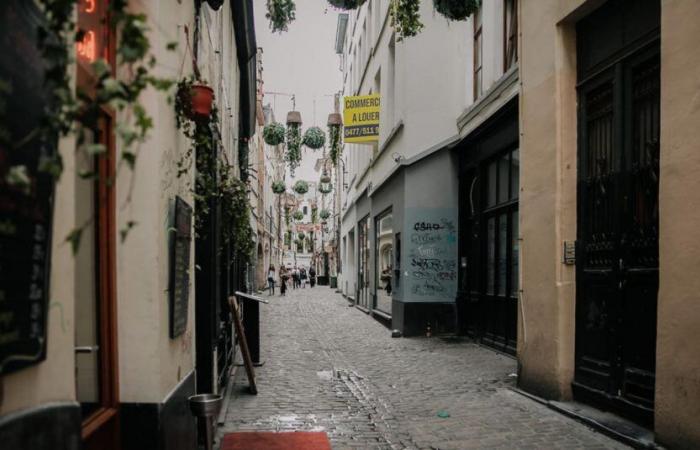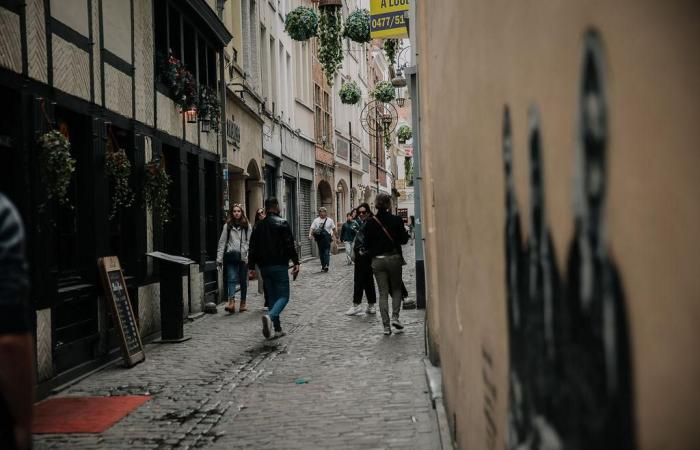A “culinary hot spot” in sight, according to Entreprendre Bruxelles, the Ilot Sacré district would be emblematic of the revitalization of the city center. A promotional observation to qualify.
“Above all, don’t be fooled by its former reputation as a tourist trap street, where passers-by were solicited to taste tasteless dishes! Having been changing for several years, Rue des Bouchers is getting a makeover and is home to restaurants that will tickle your taste buds. » It was in these laudatory terms that at the beginning of November, the non-profit organization Entreprendre Bruxelles, an organization whose purpose is to support the economic policy of the City of Brussels, invited journalists to get rid of their prejudices about a corner of the capital not necessarily perceived as attractive.
Titled “La rue des Bouchers: from a tourist passage to an unmissable culinary destination”, the communication in question did not go with the back of the spoon, it which unpacked the heavy artillery of marketing newspeak in the style of “ambitious transformation », “original and trendy culinary concepts”, or even other “authentic taste experiences”.
“The revitalization of rue des Bouchers embodies the dynamic that we wish to instill in the city center: a meeting between tradition and modernity which enriches our heritage, while meeting the expectations of a public seeking authenticity and culinary diversity. This can only strengthen the attractiveness of our City,” swore with hand on heart Quentin Crespel, co-responsible for the attraction and commercial development strategy of the non-profit association. Everything is delivered with supporting figures, a nice colorful table proving that between 2018 and 2024 (well, already?), the HoReCa offer had increased by 3% – the graph also showed that empty commercial cells had passed, over the same period, from 120 to 114 units.
Having gone there regularly and having tested several new addresses, it seemed necessary to us to question this somewhat caricatured and self-satisfied praise of the reality on the ground.
It was at the time when…
For a long time, the Ilot Sacré was a lively district, frequented by people from the four corners of the capital. “The situation started to deteriorate around 2005,” explains a trader who prefers to remain anonymous. From then until 2016, historic families in the neighborhood sold their belongings. I am thinking, for example, of places like Aux Armes de Bruxelles, which belonged to the Veulemans, or Chez Vincent. When a family saga is interrupted, something is lost, an aspect of transmission is missing. » What’s next? According to the same observer, it boils down to a commercial curse in the form of an infernal vortex: attacks, works, health crisis, Good Move plan…
Lakhdar Hamina-Lakhdar, (Caffè al dente, Fight Club, Verigoud…) feels nostalgic when thinking about this neighborhood. “At the end of the 70s, when my parents left Algeria, this is where they went to eat. There were some great Brussels concepts, the area was not yet cut off from the rest of the city,” believes the man who is about to open Gazzosa, an Italian brand in the recently renovated Galerie Bortier.
“I think that the breakdown of trust with the people of Brussels occurred with the bankruptcy of the Taverne du Passage and the end of the summer Arms counter, the divorce was then finalized,” he notes. When we ask this serial food entrepreneur if he would set up a concept in rue des Bouchers or the surrounding area, the answer falls like a stone: “no”. Pattern ? “The area has too much of a tourist reputation, we associate it with fast food and sous-vide,” he explains, admitting that he already considers its location at the Galerie Bortier, “yet five minutes from Sablon,” as a sort of crash test.
A question of mentality?
For Lakhdar Hamina-Lakhdar, the reasons for this disenchantment can also be explained by a certain type of behavior specific to the capital. “It’s a matter of mentality. The people of Brussels do not like to mix with tourists. The best proof of this is the low rate of frequentation of hotel restaurants by locals. In cities like Paris or London, this problem does not exist, that says a lot,” analyzes the boss of the future Stazione in Forest.
Known for not practicing parlance, Frédéric Nicolay, designer of entertainment venues who have brought entire neighborhoods back to life, does not see himself in the Ilot Sacré either: “I would never open an address in this neighborhood, he comments. It’s about feeling. When I walk down Rue des Bouchers, I observe tourists wandering around, they don’t know where to go, it gives off bad energy. In addition, there are very few terraces, which is problematic in summer. There is no real potential for me. I would be much more motivated by an opening in Jette or Ganshoren, where people live, create links and are not just in a logic of selfies and consumption. »
Culture broth
Does this mean that we should draw a line under the Sacred Islet? Not so fast. Since December 2022, there is reason to hope for better prospects. We owe this breath of fresh air to Bouillon Brussels, a brand that has defied all predictions. Launched by Dugagjin Spahija, in the dining room, and chef Alexandre Masson, this place, strangely inspired by a Parisian concept, has nevertheless found its audience… in Brussels. The statistics from reservation and payment systems are clear: 80% local clientele in 2023 and around 70%, a percentage which should stabilize in 2024.
It must be said that several accolades have come to validate an address focusing on Belgian cuisine preparations (vol-au-vent, carbonnades, mussels, Liégeoise-style boulets, etc.), homemade, low prices and the know-how of a certified chef (Le Prévôt, Atomium Restaurant), whether it is the title of “best shrimp croquette in Brussels” in 2024 or the three “forks” awarded by the Good Food label.
In two years, Bouillon was able to “fine-tune” his approach. “We very quickly understood that we could not be as minimalist as a real Parisian broth, we had to take care of the garnishes, which forced us to raise the prices a little,” analyze the duo.
A crazy bet
“When I announced that I was starting rue des Bouchers, I was told that I was crazy,” says Alexandre Masson. In reality, my goal was to kick off the anthill, encourage everyone to renew themselves by returning to the fundamentals, namely preparations worthy of the name at affordable prices. » The result was not long in coming. “We were surprised to attract a new clientele, quite young, between 25 and 35 years old, traveling by bike or scooter. This clientele which is less present during the holidays is then replaced by tourists, this creates a perfect balance, a promise of stability for the restaurant,” summarizes the chef.
Despite this undeniable success, the duo at the head of Bouillon Brussels remains on guard and regrets a feeling of isolation – it is true that the different addresses listed by Entreprendre Bruxelles to support its statement, from Chez Léon to Kitsune Burgers, do not have no similar gastronomic aura. “We would need two or three other locomotives moving forward in the same spirit to create a ripple effect, qualitative brands which create a third path between cheap fast food and high-end products with prohibitive prices,” hopes Alexandre Masson.
Why not, as Lakhdar Hamina-Lakhdar suggests, a sort of large urban Italian canteen, with democratic prices, which would help to diversify the offer and generate added flavor?







